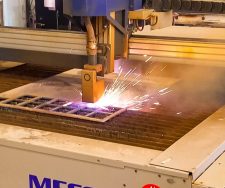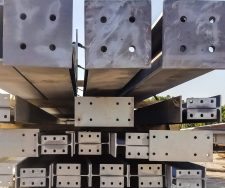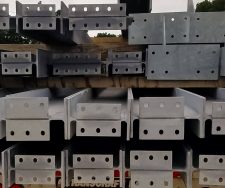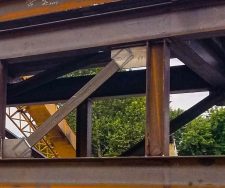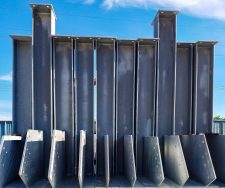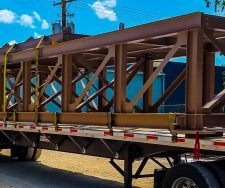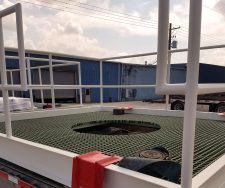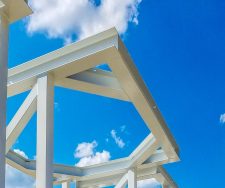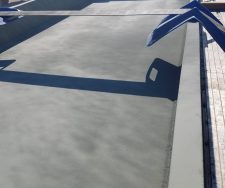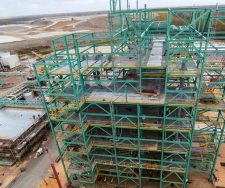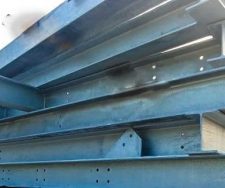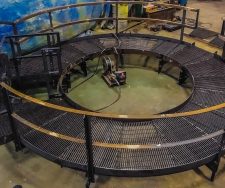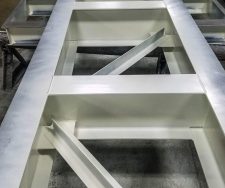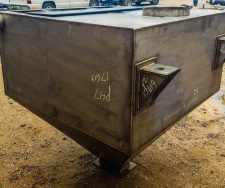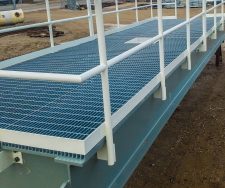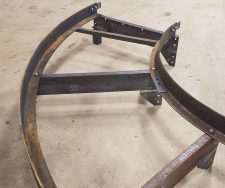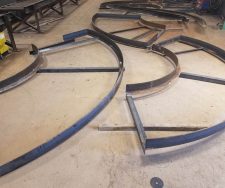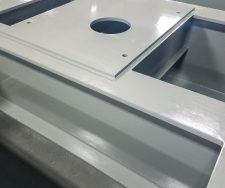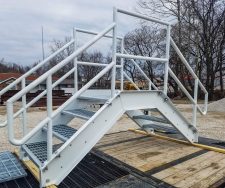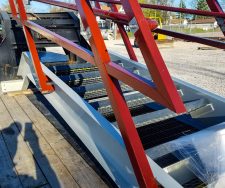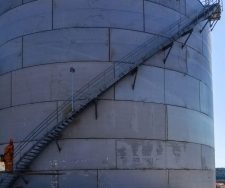Our Steel Fabrication Shop Capabilities
As custom metal fabricators, we combine innovative technology with expert processes and finishing services to offer you a complete solution. Our facility in Mount Vernon, Indiana, can fabricate steel parts in-house to help maximize your budget, including assembly of platforms with grating and handrail, stair stringers, or trusses.
We will work with you, your budget, and your unique needs to manage logistics—we’ll ship steel all over North America and overseas. We even run our own hot-shot truck and trailer for loads less than 18,000 lbs to simplify regional shipping.
Learn more about our metal fabrication services, technology, processes, and finishing below.
Gallery
Videos
Steel Fabrication Technology
We utilize state-of-the-art technology for our structural steel fabrication process. As a result, TMI Fabricators is able to create custom industrial steel products that meet the specific needs of our clients.
- SDS/2 Modeling Software: Detailing services using the latest SDS/2 modeling software to assist in fabrication.
- Strumis Purchasing Software: Strumis, a cutting-edge purchasing software system that streamlines the working process, maximizes material efficiency, and increases productivity.
- CNC Cutting and Drilling: CNC technology with a ficep excaliber single spindle drill line and a Messer Edgemax burntable for precision cutting and drilling.
Quality Assurance Process
TMI Fabricators is committed to providing the highest quality steel fabrication products and services. We have a comprehensive quality assurance process that begins with the careful selection of materials. We only produce high-quality steel that meets or exceeds industry standards.
Once the materials have been selected, our team of experienced fabricators will use state-of-the-art equipment to cut, bend, and weld the steel into the desired shape. During the fabrication process, our quality control team will conduct regular inspections to ensure that the steel meets our strict standards. Once the fabrication is complete, we will install the steel according to the specifications provided by the customer.
- American Welding Society certified: All welders are AWS-certified.
- AISC code adherence: Standard tolerances of a 1/8” while adhering to the AISC code of standard practice.
- 100% inspection: One hundred percent inspection with multiple hold points throughout by certified welding inspectors.
- Mill certifications: Mill certifications for every piece of material.
- Inspection record-keeping: Meticulous record-keeping of inspections—from dimension checks to hole layouts and paint DFTS.
Steel Finishing
We have a broad steel finishing capacity range, from applying a simple red oxide primer to a variety of three-part systems.
Painting
At TMI Fabricators, we take pride in our steel painting process. Our in-house painting area is 100′ x 150′, and we have a NACE level 2 inspector who oversees all painting to ensure the highest quality. We use a three-step process for painting steel: first, we pre-treat the steel to ensure optimal paint adhesion; next, we apply the primer and paint; finally, we cure the paint to ensure a long-lasting finish. This process produces a high-quality paint job that protects your steel from corrosion and wear.
Blasting
Our blasting process includes a 20’ x 50’ steel shot/grit blasting booth. We offer mechanical and hand blaster options, so you can choose the best method that suits your needs. Our mechanical blasters use high-pressure air to remove rust, paint, and other debris from metal surfaces, while our hand blasters are perfect for smaller jobs or areas that require more precision.
Types of Steel We Fabricate
We fabricate a wide range of steel types, including aluminum, carbon steel, stainless steel, hardened steel, and more.
Carbon steel
Carbon steel fabrication involves taking a steel alloy and adding carbon to it in order to increase the hardness and strength of the metal. The steel is then heated to a high temperature and cooled quickly, which helps to preserve the new properties of the metal. Carbon steel is often used in construction and manufacturing applications.
Stainless steel
Our stainless steel fabrication process begins with creating a “primary alloy.” This is typically done by melting together iron and chromium in a furnace. Next, we add other elements, such as nickel or molybdenum, to create the desired alloy.
Once the primary alloy has been created, it can be made into stainless steel in one of two ways: through hot rolling or cold rolling. Hot rolling is a process that involves heating the primary alloy to over 1700 degrees Fahrenheit before shaping it into products. Cold rolling, on the other hand, is a process that involves shaping the primary alloy at room temperature.
Hardened steel
To make hardened steel, TMI Fabricators first creates steel with high carbon content. This is typically done by adding extra carbon to molten iron. Once the steel has cooled and solidified, it is then heat treated to further increase its hardness. The steel is heated to a high temperature and then cooled very quickly. This process, known as quenching, creates a harder steel that is less likely to break or deform under stress.
Abrasion plate
Abrasion plate is steel that has been specifically designed to resist wear and tear. It’s often used in high-impact areas where there is a lot of friction, such as chutes, conveyors, and decks.
Aluminum
Aluminum is one of the most versatile materials available for fabrication. It is strong yet lightweight, making it ideal for a wide range of applications. Aluminum can be easily formed into shapes, and it has a high resistance to corrosion. Making aluminum involves drawing the metal out into thin sheets, which are then rolled and welded together. The resulting product is then anodized to give it a protective coating.
Steel Forming Processes
Our forming processes include sawing, shearing, rolling, oxy-fuel cutting, and plasma cutting. This allows us to create a variety of shapes and sizes to meet your needs. We use state-of-the-art equipment to ensure precision every time.
Sawing
The saw blade is mounted on a motorized arm and is passed through the steel at high speed. It can be operated manually or by an automatic control system.
Oxy-fuel cutting
The oxy-fuel cutting process uses a torch to heat steel until it reaches its melting point. The biggest advantage of oxy-fuel cutting is that it can be used on any type of steel, regardless of thickness. Additionally, oxy-fuel cutting produces little waste, as the molten steel can be collected and reused.
Plasma cutting
The plasma torch uses an electrical arc to ionize a stream of gas, creating a plasma jet that can reach temperatures of up to 30,000 degrees Fahrenheit. This high-heat plasma jet is then used to cut through the steel. Plasma cutting is a very efficient way to cut steel, and it can produce clean, precise cuts with very little distortion.
Welding Processes
- SMAW
- GTAW
- GMAW
- FCAW
Raw Material Forms
- Sheet
- Tubing
- Angles
- Flat stocks
- Channels
- Beams
- Round bar
- Square bar
Leadership & Craftsmanship
- Welding inspectors (CWI)
- NACE level 2 inspector
- Welders
- Foreman
Quality Assurance & Testing
- Radiographic examination
- Magnetic particle examination
- Liquid penetrant examination
- Ultrasonic examination
- Penetrant testing
Learn More About Our Steel Fabrication Shop
If you’re interested in learning more about steel fabrication or other services offered by TMI Fabricators, contact us today. We look forward to assisting you with your industrial projects.
